Faith and Politics
As millions of Americans wait in long lines to vote today, David Firestone wonders why it has to be so difficult.
“This is the day when voters raised on a reverence for democracy realize the utter disregard their leaders hold for that concept. The moment state and local officials around the country get elected, they stop caring about making it easy for their constituents to vote. Some do so deliberately, for partisan reasons, while others just don’t pay attention or decide they have bigger priorities.
“The result can be seen in the confusion, the breakdowns, and the agonizingly slow lines at thousands of precincts in almost every state.
“As they stand in windswept, hour-long lines to cast a ballot, voters might ask themselves, why are there so few polling places and workers? Why isn’t the government making it easier for me to vote, rather than forcing me through an endurance contest?”
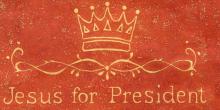
Jesus for President. Amish for Homeland Security. We had some good ideas for serious change in America.
As Christians, we became convinced that the issues –things like immigration and health care, and the growing disparity between the rich and the poor – these things matter to God. We see more than 2,000 verses in Scripture that talk about how we care for the poor and marginalized. And too much of the Christianity we grew up with was so heavenly minded that it was no earthly good. So the issues matter to us.
But, we were, and still are, political refugees in post-religious-right America. No party feels like home. No candidate seems to value the things we see Jesus talking about in the Sermon on the Mount. Federal budget cuts have begun to look like the antithesis of the Beatitudes, where Jesus blesses the poor and hungry rather than the rich and wealthy. You get the sense that if Mary proclaimed her famous “Magnificat” in Luke’s Gospel today — where “God fills the hungry with good things and sends the rich away empty” — she’d be accused of promoting class warfare. As one theologian said, “Our money says in God we trust … but our economy looks like the seven deadly sins.”
What would America look like if Jesus were in charge?
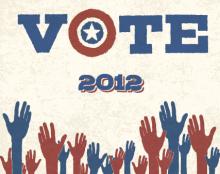
My early voting ballot is almost complete. I have done my reading, finished my research, and ignored a sufficient amount of robo-calls and attack ads. I have made my choices for county school superintendent, state representatives, and even U.S. Senator. But there is a gaping hole at the top of my ballot ...
It is November 6, 2012, and after more than a year of carefully following the presidential campaigns I still do not know which candidate I am going to vote for. I am an independent voter but registered as a democrat. On my Facebook page I identify my political position as "a morally-conservative Democrat or a fiscally-irresponsible Republican."
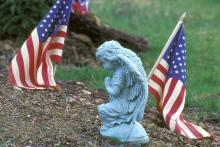
It’s here, God — Election Day in America. Today is the day when Americans everywhere are given the privilege and responsibility to exercise dominion (agency) at the polls.
Scripture tells us every human being is made in the image of God. We are, therefore, equally worthy of protection of the law. The United States Constitution and its Amendments tell us we are equally worthy of life, liberty, and the pursuit of happiness. Yet, at this very moment, laws stand poised to snatch dominion from the hands of the poor, the weak, and the vulnerable, ethnic minorities, students, and the elderly. Some scurrilous elected officials have worked behind the scenes to suppress the ability of voters to elect the person of their choice — all for the sake of politics
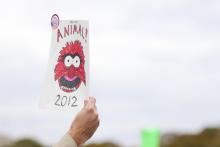
Last Saturday, supporters of Public Broadcasting gathered in Washington, D.C., for a march in response to Mitt Romney's now-infamous Big Bird comment, referring to his plan to cut funding for PBS. Armed with puppets and posters, the rally culiminated in speeches and puppet shows with the backdrop of the nation's Capitol building.

I’m tired of reading blogs from my White Christian brothers about why they are choosing to vote. There. I said it.
I’m all for being a part of the democratic process, but it seems a bit odd to me that so many of these bloggers are coming from a position of power and privilege they themselves have always had. It seems a bit arrogant to choose something that was always theirs.
The way I see it, they had better vote. The vote of the White male is what finally allowed people like me – a woman, an immigrant, a non-native English speaker – to have the right to vote. I didn’t have a voice. I didn’t matter. Neither did my ancestors, who immigrated here under quota systems developed by people in power for the benefit of the country and the powers-that-be.
And there still are people who have no voice, who have no right to vote, but they are directly impacted by the politicians, referenda, judges, and local officials as well as the “agendas and policies.” As a Christian who is new to the process, its a privilege and responsibility I don’t take lightly because it isn’t a given. I’m not American born. We are not post-racial America, and the fact of the matter is the church isn’t either. We are working on it, but we aren’t there.
Did you know that in 1882 Congress passed the Chinese Exclusion Act denying citizenship and voting rights to Chinese Americans? Yup, they could build the railroads but they can’t vote.
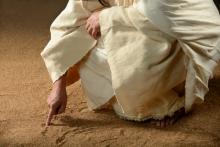
Jesus didn’t vote today
Not tomorrow
Not yesterday
Jesus didn’t need the bullet or the ballot box or
The bomb or bayonet or budget
Jesus didn’t vote today
Jesus didn’t authorize drone strikes to kill thousands
Jesus didn’t occupy other countries with standing armies
Jesus was occupied by the Holy Spirit that occupies us even still
Jesus was occupied by the truth of radical love
Jesus was not a feeble, timid, compromised, casual, comfortable, middle-class,
Or otherwise complacent ap
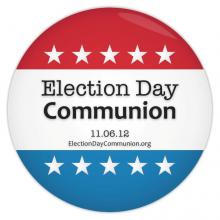
Tuesday, Nov. 6, is Election Day. As we’ve seen these past months, in a closely divided country, elections bring out the worst in us. Hundreds of millions of dollars in negative advertising, families and churches divided, each side convinced that a victory by the other side will be disastrous for the country.
It is clear that Christians will vote in different ways — some for Barack Obama, some for Mitt Romney, some for another candidate, and some will not vote. But Tuesday evening, Christians in more than 800 congregations will be gathering together for communion, regardless of party, political affiliation, or denomination.
The Election Day Communion campaign is the vision of several pastors to build unity in Christ in the midst of theological, political, and denominational differences. In sharing communion together, the Campaign says, Christians can reaffirm our allegiance to Christ and remember some basic truths.
SALT LAKE CITY — As Americans cast their ballots and the clock ticks toward midnight in Mitt Romney’s quest for the White House, this much is clear: Americans didn’t know much about Romney's Mormon faith when this “Mormon moment” began.
Now, thousands of headlines, dozens of TV newscasts, and one Tony-winning Broadway musical later, Americans still don’t know much about Latter-day Saints and their beliefs.
But they know more. All those stories educated millions of observant Americans about The Church of Jesus Christ of Latter-day Saints. Still, some “understandings” remain misunderstandings — and many views of the religion are still skewed, exaggerated or flat-out wrong.
Here are 12 persistent myths about Mormonism.
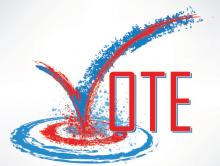
Next week I will vote for the first time in a presidential election. I became a naturalized U.S. citizen two years ago, giving up my Korean passport, my (not)green card, and pledging allegiance after having lived in the U.S. since the spring of 1971.
I actually studied for my citizenship exam out of fear and habit – fear that the wrong answer would mean restarting a process that had cost money, time, and emotions, and habit because I grew understanding not studying was not an option. The process actually took years for me, wrestling through ambivalence, frustration, grief, and gain to get to a point where the privileges, advantages, and necessities of becoming a citizen and my faith as a Christian pushed me over the edge.
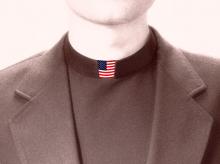
During the 2004 presidential election season, Sojourners put out a bumper sticker with these words: “God Is Not a Republican, or a Democrat.” The number of orders was overwhelming and we kept running out. The simple message struck a chord among many Christians who were tired of the assumptions and claims by the Religious Right that God was indeed a Republican, or at least voted a straight-party ticket for the GOP. They also absurdly implied — and sometimes explicitly stated — that faithful Christians couldn’t support Democratic candidates. We said that voting was always an imperfect choice in a fallen world, based on prudential judgments about how to best vote our values, that people of faith would always vote in different ways — and that was a good thing for a democracy and the common good.
Our efforts appeared to inject some common sense into our nation’s political discourse, but given recent electoral statements and newspaper ads from some conservative Christian leaders, it appears the message bears repeating — God is still not a Republican or Democrat.
THE RED, RUN-DOWN, two-story frame house on Morris Avenue in the West Bronx that houses the Picture the Homeless offices looks much like those around it, except for the organization’s blue banner that hangs from the porch. The youths (there are older members too) who log in to their homeless blogs and look for jobs on the computers upstairs, surrounded by images of Zapata and the Selma freedom marchers, are mainly black and Latino, and they could be almost any of the young people you see on the street. Picture the Homeless is seamlessly embedded in this New York City neighborhood, where the new poor from Africa and South Asia join the long-established poor from Puerto Rico and the Dominican Republic.
Picture the Homeless (PTH) combines social action, advocacy, outreach, and community and is run almost exclusively by homeless and formerly homeless New Yorkers. The organization’s name references the importance of challenging widespread stereotypes about people who are homeless. “Don’t talk about us; talk with us” is a PTH slogan, and it claims as a founding principle that “in order to end homelessness, people who are homeless must become an organized, effective voice for systemic change.”
Kendall Jackman, in her 50s, one of PTH’s housing organizers, lives in a women’s shelter not far from Morris Avenue. The former postal worker from Brooklyn’s Bed-Stuy neighborhood—“No matter where I live, I will always be a Bed-Stuy girl,” she said—lost her housing two years ago when the building she was living in was foreclosed on.
“Of the 72 women in my shelter, 69 of us either work or go to school,” Jackman said. “With no low-income housing available, shelters are now the homes of the working poor.”
AS LARRY WATSON arrived by charter bus at the Corrections Corporation of America in Nashville, Tenn., apprehension pulsed through his body. An ex-offender, Watson had been at prison facilities before, but never for this reason—and never willingly.
Watson had been incarcerated three different times—in 1978, 1983, and 1990—for distribution of drugs. The last time, he was sentenced to up-to-30 years in jail. He was released on Jan. 14, 1993, after serving 36 months.
Now he found himself on a very different path. Watson and 17 others, mostly ex-offenders, had trekked nearly 700 miles in May 2010 on a pilgrimage from Washington, D.C., to Nashville. As they pulled into the grandiose Corrections Corporation of America (CCA) headquarters, home to the largest private prison company in the United States, a swarm of security officials greeted them. Watson and his fellow sojourners became increasingly mindful of the spirit in which they journeyed.
Their plan was creatively simple: Purchase a share of stock in the Corrections Corporation of America, the behemoth corporation that owned the private prisons where some of the group had been incarcerated. Attend a CCA shareholders’ meeting. Then, as stockholders, tell their personal stories as a way of witnessing to the “spiritual crisis” occurring within the prison industry, while also building relationships with key CCA personnel.
In essence, using their experience from the inside, members of the group planned to tell CCA how to do its job better.

A number of Roman Catholic bishops are making forceful last-minute appeals to their flock to vote on Election Day, and their exhortations are increasingly sounding like calls to support Republican challenger Mitt Romney over President Barack Obama.
The most recent example: a letter from Illinois Bishop Daniel Jenky accusing the administration of an unprecedented “assault upon our religious freedom” and implying that Catholics who pull the lever for Democrats who support abortion rights are like those who condemned Jesus to death.
“Since the foundation of the American Republic and the adoption of the Bill of Rights, I do not think there has ever been a time more threatening to our religious liberty than the present,” Jenky writes in the letter, which he ordered priests in his Peoria diocese to read at all Masses on Sunday.
In the letter, Jenky blames Obama and the Democratic majority in the Senate for trampling on the Catholic Church’s rights and moral convictions by requiring health insurers to provide contraception coverage. Jenky also compares abortion rights supporters to the Jewish crowd in Jerusalem that pledged loyalty to the Roman Empire and demanded that Pontius Pilate crucify Jesus.
“For those who hope for salvation, no political loyalty can ever take precedence over loyalty to the Lord Jesus Christ and to his Gospel of Life,” Jenky writes.
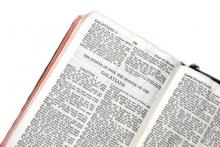
The apostle Paul calls the church in Corinth a body — and that’s political language: “God has arranged the parts in the body, every one of them, just as he wanted them to be … As it is, there are many parts, but one body” (1 Cor. 12:18-20).
As Dale Martin argues in his book The Corinthian Body, Paul gets his language about the social body, the political body, from other Greco-Roman speeches and letters. He uses a style of writing and speaking called a “concord” — homonoia in Greek. Politicians would give speeches or write letters trying to convince the diverse people of the city to unite in a common project, to share the same goals for society, to share a common politics. In these “concord” addresses, politicians would call the society a body, just like Paul does in his letter to the divided church in Corinth. We are one body, politicians would say, so we need to act accordingly. We are one — united, bound together. Of course, politicians only made these speeches when they needed to: that is, when dissatisfied segments of society wanted to revolt (see Martin, Corinthian Body, 38-47).
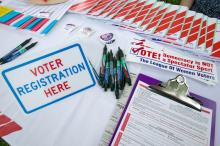
In four days our nation will decide its course for decades to come. On Nov. 6, ordinary people who have not already sent in their absentee ballots or stood in line to vote early, will walk, drive, caravan, and bus their way to polling stations scattered across every state in the nation. These ordinary people will exercise their right as American citizens to vote. They will also exercise their God-given call, as human beings made in the image of God, to exercise dominion (agency) within our grand democracy. Or at least they will try.
The deep waters of injustice are rising high and threatening to spill over on Nov. 6. Voters will have to wade through muck and mire to cast faith-filled ballots this year. So, listen up, study up, and get your gear on in preparation for Nov. 6.
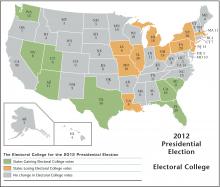
The United States is the only democratic country in the world where a candidate can be elected as president without earning the highest number of votes.
In the midst of competing campaigns and critical choices leading up to Election Day, one of the most common assumptions is that U.S. citizens directly select their president. However, far too many fail to fully understand that such direct selection is not our reality, for within our complex electoral system – known as the Electoral College – the will of the people does not always translate into final results. During the presidential elections of 1876, 1888, and 2000, the leader in popular votes did not claim victory, and some believe a similar scenario may take place in the near future. And so, when a candidate receives the majority of votes but is not sworn into office, we recognize a gross injustice that requires immediate and significant transformation.

Most people in America, whether they are religious or not, prefer consistency in the faith community to hypocrisy. One of the reasons the fastest growing demographic in religious affiliation surveys is now “none of the above” is that too many people see more religious hypocrisy than consistency.
Religion is not, at its core, politically partisan. But too often religion becomes a political tool; and we see that on both sides of the aisle. That does not mean people of faith shouldn’t have strong convictions or feelings about political issues or shouldn’t vote one way or another; or that there is a moral equivalency between the political parties and it doesn’t matter which way we vote. Elections are important, and people of faith should be voting as citizens and by their most basic values.
But let’s be clear: On Nov. 6, neither a Republican nor Democratic victory will bring in the Kingdom of God.
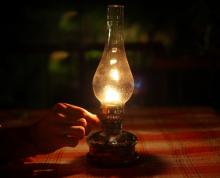
“Long Time Gone” is David Crosby’s anthem of hope in jeopardy. He wrote it the night Robert F. Kennedy was assassinated.
“I believed in him because he said he wanted to make some positive changes in America, and he hadn’t been bought and sold like Johnson and Nixon – cats who made their deals years ago with the special interests in this country in order to gain power,” Crosby wrote in the liner notes of the 1991 CSN boxed set. “I thought Bobby, like his brother, was a leader who had not made those deals. I was already angry about Jack Kennedy getting killed and it boiled over into this song when they got his brother, too.”
In the ‘60s, the Kennedys represented hope for change: racial equality, economic justice, and abolishing the death penalty, for example. Five decades later, you still don’t see many long-haired politicians, but that hardly seems the matter of dire culture import that it apparently was in 1968. And now we have a black president. Still, on the whole, Crosby’s words seem prescient, rather than anachronistic.
Almost 50 years later, we’re still giving legal benefits to some couples but denying them to others, not to mention that we fill our prisons with brown-skinned people, too many women are still ashamed to report rape or domestic violence, greedy people hoard resources while others go hungry, and the president who campaigned on hope hasn’t been able to bring any real change in our unjust economy.
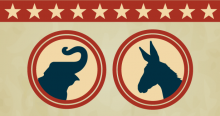
As the winds and the rain of Hurricane Sandy settle down, one bit of the aftermath is going to be another round of conversation about how climate change is affecting our world.
It’s not a conversation you have heard much of in the presidential campaign this year. Climate change is one of a quartet of issues that will have a huge impact on the future of this nation that have gotten short shrift by both President Barack Obama and Gov. Mitt Romney.
Poverty. Guns. . Drones. Climate change.
Bring up any of those issues and watch the candidates make a quick nod of concern and then scamper away from any specifics. Yet those issues will be with us long after Nov. 6, so it is incumbent on those of us in the faith community to be laying the groundwork now for how we will address them in the coming year.
That work has already begun, of course. The challenge is not to let the post-election exhaustion sweep away those concerns like they were potted palms on a pier in the midst of the hurricane.